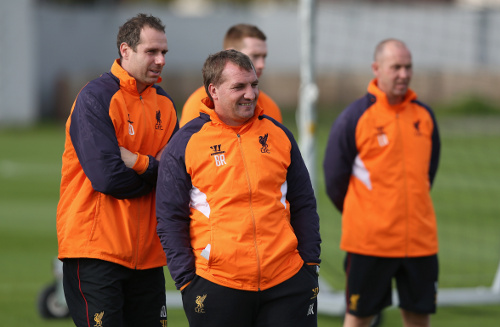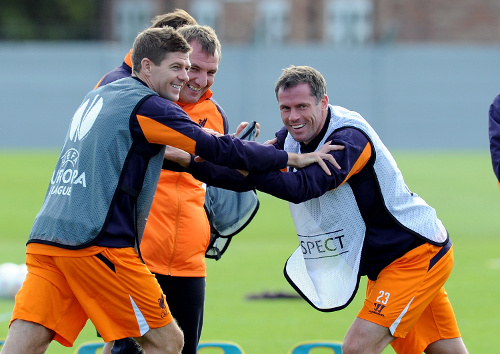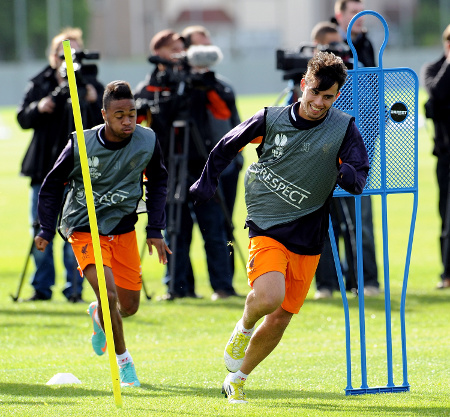An insight into how LFC train
The implementation of Brendan Rodgers' football philosophy has been evident for all to see – but just how does the boss and his team go about getting the players comfortable with the style? Liverpoolfc.com popped along to Melwood to find out.
Upon arriving at Anfield in the summer, Rodgers brought with him several members of backroom staff whom he had worked with over the course of his career.
One of the new faces at Melwood was that of Glen Driscoll - the former Chelsea and Swansea coach who was appointed as the Reds' head of performance.
Here, in his first sit-down interview since arriving at the club, Driscoll talked Liverpoolfc.com through what his role at the club entails, explained how Rodgers has set about imposing his philosophies on the squad and described what makes our manager unique to the others he's worked with in his career, including Jose Mourinho.
Glen, firstly can you explain what your role as head of performance involves?
The role basically entails making sure there is a common unity and strategy between the science and medical departments, leading into the methodologies we're working to. That also includes a strategy through the youth and elite development set-ups up to the first team. So I make sure there is a common methodology throughout the club leading into what the manager is expecting.
So, we're playing Reading at Anfield this weekend. Typically, what would your role be in gearing up for that?
This week has been a different week being an international break, but we've had Jose Enrique and Jon Flanagan joining back into training, so part of my job has been to make sure we've had a seamless transition into training for them. It's good to have them two back. Obviously we've had international games, so players may have picked up issues, so it is the job of the medical and science teams to keep an eye on them and feed it back. Between us, we'll work out which players need to recover and which need to train depending on what they've done. Leading into the Reading game, there are elements of science we can look into - we can blood and saliva to check the players have been fully recovered from their international endeavours. It's all about making sure the players are ready to go and we're well-prepped for the Reading game.
And after a game, what sort of role do you take on?
After a game, we'll do a check around the players to make sure there are no issues and we then immediately look at the next game, which after Reading is Anzhi on the Thursday night. Ultimately, the players who haven't played will need some add-ons and extra work and we'll start immediately post-game at looking what training the players need to make sure they're ready.
Looking back over your career so far, you joined Liverpool from Swansea in the summer but before that you spent 10 years at Chelsea. It's fair to say you worked under some big characters there...
It was a great time for me to be at Chelsea and it was probably the most successful era at the club at the time. From the players' perspective, once you're working with the big players - and it's the same here at Liverpool - the common denominator is always that the best players work the hardest. That's a trait I've spotted and there is definitely a crossover onto the pitch on a matchday. It was great for me to see how different managers work at Chelsea - they've all got their own unique traits and ways of working. It's something that will help me going forward and hopefully I can use all the experience, skills and qualifications to help take Liverpool forward.
You also performed a variety of different roles. What were they?
I was the head physiotherapist, head of injury prevention, head fitness coach and head of fitness and conditioning at Chelsea, and I was also head of science and medicine when I worked at Swansea. That enables me to have empathy with the different roles you get within these departments. Ultimately, I hope it will be an advantage coming into this role at Liverpool.

What sort of relationship did you have with the likes of Jose Mourinho at Stamford Bridge?
It was a strange sequence of events as I came in at the end of Claudio Ranieri's era. Then Jose came in and at that time, I'd just left Brendan at Reading to come in and become the fitness coach and physiotherapist for the youth team with Steve Clarke. Steve then moved up with Jose and Brendan came back to Chelsea. Under Jose, Brendan and I followed the football-specific and global methodology that he brought in. Eventually, Jose brought me up to head of injury prevention for the first team and I worked more closely with him. Like Brendan, I have a lot of respect for him and probably wouldn't have gained the qualities I have now if it hadn't been for him.
How influential was Mourinho on shaping Brendan Rodgers' football philosophy?
Brendan and I took it upon on ourselves to follow this methodology and I think it's something that has really helped both of us. Any derivatives and coaches that have worked with Jose have also been successful. He had a great influence on us, but like every methodology there is evolution. It has evolved for us - that's normal in football and you find the best route for the players you have in order to gain the most success.
This is the fourth club you've worked with Brendan at. What makes him unique as a manager?
All the managers I've worked with have their own unique traits - but Brendan has the best mix. I still have strong relationships with many of the managers I've worked with, and so I mean no disrespect, but Brendan definitely has a unique combination of all the best traits I've seen. Carlo Ancelotti was very humble and showed a lot of humility - I see that in Brendan. I also see the man-management style of Guus Hiddink and obviously the methodologies of Jose [Mourinho] in him. For me, I feel very privileged and lucky to now be working back with Brendan.
Can you explain the ideals behind the style Brendan and the backroom team are implementing here?
In effect, it's a football-specific methodology. Gone are the days where we'd run players and they'd run around pitches doing the 1000 metres. You can get all the attributes of fitness via football. With applied science, GPS and heart and lung monitors, we can basically make sure players achieve that - whereas in the past, it was easy to standardise training and fitness in terms of running from A to B and how fast players were running. Now we have GPS, we can gather that information while also having players technically, tactically and physically combining what they'd do on the pitch. The players are going to be more motivated because they're enjoying training, we're going to be preparing and conditioning them to the best effect and that should be in line with what we want to do in the game.

Players seem to really enjoy training - how important is that?
Motivation is everything. It doesn't matter how fast you are or how far you can run, if you don't switch that on, it's not relevant. The importance of switching the right muscles on at the right time in order to enable you to perform in context to a game is vital. These players are running 8000 metres a session, they're hitting 1000m above 21kph in sessions and games...they're working very hard, it's just in more relation to what we want them to do on a matchday and that's important. When the players are in a game and working, they'll know they've worked in the some context and gain confidence from that having overloaded those moments in training. Ultimately, when called upon, they should be able to work harder than their opponent on matchday.
Swansea were regarded as one of the fittest teams in the league last season - will the same be said of Liverpool this year, in your opinion?
Yes, I think so. The way Swansea performed, added to the fact they had an incredible injury record which I think was the best in the league, shows we have the philosophies to help Liverpool. There's always going to be a transition, but long-term the crossover onto the pitch is going to be very apparent for everyone to see.
You've been here now for four months or so - what did it mean to you to get the chance to join Liverpool?
I'd sat in the opposition dugout here and been involved in some pretty amazing Champions League games at Anfield. To finally be sitting in the Liverpool dugout makes me very proud. It was obvious when I came here there is an aura at Liverpool and there is class here. The passion around the city and football club is something different. With no disrespect to Chelsea as I had a great time there, enjoyed some amazing moments and still have colleagues and friends there, it just feels the set-up here could really take Liverpool above and beyond. It is a privilege to be here and my only focus is to try and make sure we achieve success. I'm 100 per cent positive we will do that.
Where do Liverpool stand in terms of the medical and sports science team we have here?
What was really obvious to us when we came here is that there has been a massive expansion in those departments. It was important for us to try and bring everything together and be a little bit more efficient in terms of the reams of data and science we're collecting in order to have a little bit more of a product in line with having a successful outcome. There were always going to be things we can bring in and improve on, but at the same time there were definitely areas that were exceeding what we achieved at Chelsea. I have been really impressed with the medical team and the staff here. We've got really good, dynamic physiotherapists here. Chris Morgan is our senior physiotherapist and having worked with many, many top physios, I really wouldn't replace Chris with anyone - he's been excellent and has so many attributes. The physios working with Chris, the doctor and the other soft tissue staff have been so impressive. We've had some changes which I think will ultimately enable us to create one common direction and take us forward.

Ryland Morgans recently joined the backroom team. He's someone you know well - what will he bring to LFC?
I went to Swansea about this time last year, so I had seven months with Ryland and was immediately impressed, bearing in mind I'd performed Ryland's job at Chelsea. I felt I'd achieved a lot of success in my time, but there are so many attributes I wish I'd had that Ryland has. He's excellent on the pitch and I think the players have immediately seen a massive difference in what he can give Liverpool and the levels he can take the club too. From a professional perspective, he's in line with the methodologies, he worked with Brendan for two years and that's important. I've built up a really good relationship with Ryland, so I'm excited to be working with him. He's really got an exceptional CV and experience in football. He is someone who can definitely improve us in this area and take us on.
What will his role as head of fitness and conditioning entail?
Ryland has come in as head of fitness and conditioning, which is a similar role to the one Darren Burgess did until he recently left us. He'll be in charge of taking warm up and physical sessions and basically help run the science department, linking in with myself, the medical team and the manager. He'll ultimately provide a service which I think will be really beneficial for Liverpool.



